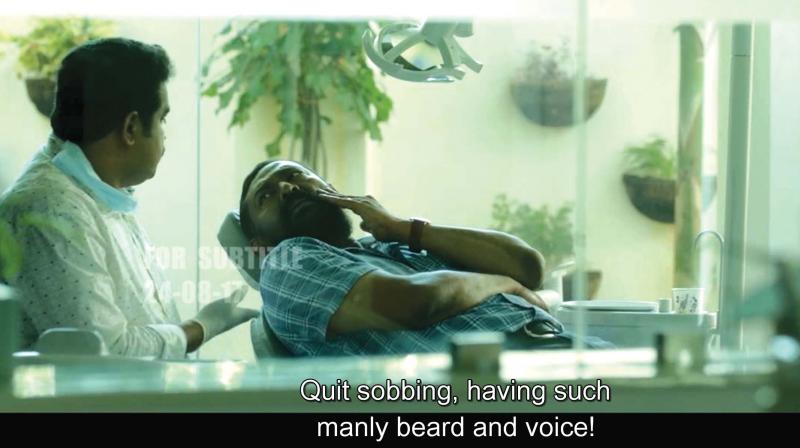Makers of the scrolling art

At film festivals, at those rare screenings of world cinema, we flock together, fighting for space. Circling and yellowing in our crumbled schedules, movies to watch, never thinking of the language it comes in. What we take most for granted are the words in English that quietly scroll through the bottom of the screen. The words that make it possible to understand many worlds. The subtitles. What happens one way somehow surprisingly didn't happen the other way for a long time. Malayalam cinema, always known for the gems it produced, remained largely 'unsubtitled' for long. Which meant it limited the number of people who could enjoy it. And according to veteran critic and occasional subtitler CS Venkiteswaran, the quality was not grand either.
Says he, "I've subtitled more than a hundred Malayalam films during the last decade or so. My feeling is that compared to films from languages like Hindi and Bengali, the quality of English subtitling of Malayalam films leaves much to be desired.” He adds, “Subtitles should be as precise as possible and universally comprehensible, without sacrificing the ‘local flavour’ of our language and culture. Here, either we go very verbatim or use cultural-specific terms, which defeat the purpose of subtitles. For instance if a term like Uppa, Umma, or Accha is used throughout the film, it is better to maintain it. That way we also introduce a Malayalam word to the world. But if it does not recur, there is no point in using it, for the viewer won’t be able to make sense of it. We’ve to learn a lot from French films in this regard. I've been inspired by their use of language that is poetic and precise.” If you want to become a good subtitler, he says, along with good command over language, you should closely follow the subtitles of other films. “People have also done a lot of experimentation with fonts, size, italics, etc. which we are yet to play with,” he says.
A go-to man when it comes to English subtitling of Malayalam cinema these days is Vivek Ranjit. “I must have worked in about 50 films now including the latest, Velipaadinte Pusthakam. But when I started this work in 2011, few knew my name and there was no mention in the credits. It’s from Kunjiramayanam that I began aggressively marketing myself on Facebook and began getting more work,” he says. Vivek found subtitling interesting at the time of Beautiful. He had then just joined director V.K. Prakash as an assistant, after his course at the Pune film institute. “They wanted Beautiful to be subtitled to send it for national awards. A friend of mine and I worked on it. We realised it was not just about making English dialogues, but also about timing, the number of words, and so on,” he says.
Later, Vivek co-wrote the script of Kili Poyi, and that took his name further around. “It was at first movies of young stars like Nivin Pauly and Dulquer Salmaan that I got,” he says. It is later that he got to work on the films of senior stars like Mammootty and Mohanlal. He adds, “I also got to work with different directors, from Sathyan Anthikad and Ranjith, to Lijo Jose Pellissery and Vineeth Sreenivasan. One of his biggest moments came when he was working on the subtitles of Solo — Tamil and Malayalam — in Mani Ratnam's office and met the great director briefly, who is one of his all-time favorites. There is the occasional bad moment too, when he is sometimes tricked and not paid. “That comes not from small-budget films but big-budget ones. Not all of them, but a few. The makers treat us like they are doing us a favour. They don’t recognise the value,” he reveals.
New subtitler on the block, Sruthi Sikhamani, is just learning the techniques. “It’s not just translation, there are a lot of technical aspects. There is a software used and I found one without any guidance and started using it, not knowing if that’s what’s usually used,” Sruthi says. She had come to the film industry to work her way up and make films. Sruthi has worked as AD in a few films, assisting the likes of Anjali Menon and Anil Radhakrishnan Menon. She says, “I think it’s with Bangalore Days (directed by Anjali Menon) that English subtitling suddenly gained prominence. Before that, Malayalam cinema found its way outside through dubbed films, which can sound quite unrealistic. And for subtitling, we used to send films to Mumbai. They too left a lot to desire. Most of them tried direct word by word translation, which wouldn’t always work.” Sruthi’s first subtitling happened now for Njandukalude Naattil Oridavela. “I started when I realised it was interesting. And because of my love for the English language,” she says. She’s already got her second work — Sherlock Toms. But all this happens on the side as Sruthi continues to work on her film, now writing a script.

